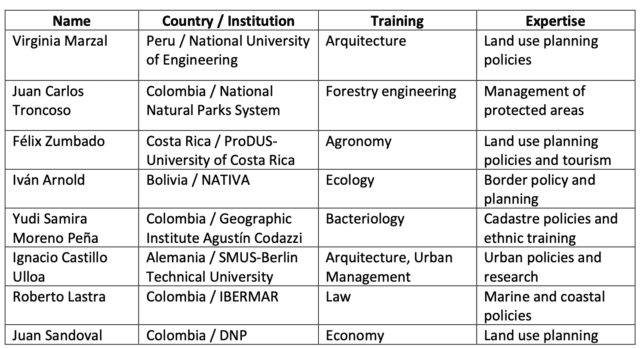Background
Latin America and the Caribbean have a multi-diverse territorial context. At the ethnic level, for instance, there are 54.8 million indigenes or native populations, 133 million Afro-descendants, Roma (gypsy people) and peasants, among others. Regarding languages, besides Spanish, Portuguese, French, between 420 and 550 indigenous languages are spoken. Moreover, there are both unitary and federal republics. Form a global ecological perspective, this continent is home to 8 of the 17 countries considered megadiverse: Bolivia, Brazil, Colombia, Costa Rica, Ecuador, Mexico, Peru and Venezuela. Throughout these countries a coastal marine territory spans the Pacific, Atlantic and Caribbean oceans; their geographies includes large biomes such as the Amazon, the Andes, the Cerrado and the Chaco, among others. Due to the state of conservation and functionality of their ecosystems, Latin America and the Caribbean jointly generate “a third of the fresh water, a fifth of the forests and 12% of the planet’s arable land, as well as mining and hydrocarbon reserves”. Finally, with 80% of its population located in cities, Latin America and the Caribbean are considered to be the most urbanized region on the planet.
The Economic Commission for Latin America and the Caribbean (ECLAC), in its publication “Planning for sustainable territorial development in Latin America and the Caribbean” (2019), reviews the evolution of public policies in the region from local, then regional and now territorial development, and identifies diversity, the rights-based approach, sustainability and inequality as emerging issues to be addressed in the formulation and management of public policies for territorial development, and also recognizes the need to strengthen the capacities and assets of the territories and their stakeholders to meet the challenges of sustainable development.
Latin America and the Caribbean, without a doubt the “continent of hope”, has made heterogeneous progress along diverse lines: the vindication of ethno-territorial rights (14 countries have signed the ILO Convention 169), biodiversity conservation, the formulation of territorial planning and development instruments, conflict prevention and management, disaster risk prevention and management. At the same time, great challenges are faced:
• adaptation to climate change,
• the implementation of inclusive policies that reduce territorial gaps,
• the valuation of traditional knowledge and the dialogue of knowledges,
• halting biodiversity loss,
• multi-scale, inter-institutional and community management,
• being able to build on diversities between human beings as well as between sectors within an environment of peace with nature.
Precedent
Between August and September 2022, the ECLAC Planning, Government and Development network held the discussion forum “Differential approach in the formulation of public policies for development and territorial planning”. Participants made important reflections on the need to:
• recognize diversity (actors, territories, institutions, historical moments) as a characteristic that functions as both the basis of and enabler for a contextualized adaptation and planning;
• articulate development and territorial planning with one another to achieve social inclusion and reduce territorial gaps;
• to advance the participatory construction of common visions for the territories that would allow to go from a merely instrumental approach to an informed understanding and management of conflicts, thereby promoting scenarios of peaceful coexistence and collective well-being;
• encourage action-research-management, as a process whereby knowledge and the joint construction for an effective intervention are generated or recognized
• to both clarify the roles of and identify as well as facilitate the complementarity among the diverse actors;
• to manage biodiversity as an essential and transversal element in: the implementation of the SDGs, development planning, achievement of adaptation to climate change and the generation of resilient territories, and;
• to adapt the scales of management according to an integral concept of territory that considers and manages the marine environment, borders, and urban and rural settings, in consonance with each socio-ecosystemic context. This requires, among other aspects, the harmonization of planning instruments and, of course, information for relevant collective decision making at the local, subnational, national and border level.
Main objective
Sharing academic insights on the conceptualization and practical experiences with the application of the differential approach in the formulation and/or management of development and territorial planning policies.
Panelists
Details
Coordinator: Gisela Paredes Leguizamón (SMUS Partner)
Watch and find further information about the roundtable discussion here. Please note that the video is only available in Spanish.







